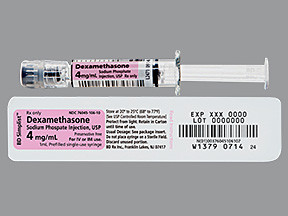DEXAMETHASONE - INJECTION
PHONETIC PRONUNCIATION: (dex-uh-METH-uh-sown)
COMMON BRAND NAME(S): Decadron Phosphate
GENERIC NAME(S): dexamethasone sodium phosphate
Uses
USES: This medication is used to treat various conditions such as severe allergic reactions, arthritis, blood diseases, breathing problems, certain cancers, eye diseases, intestinal disorders, and skin diseases. It is also used to test for an adrenal gland disorder (Cushing's syndrome). It decreases your body's natural defensive response and reduces symptoms such as swelling and allergic-type reactions. Dexamethasone is a corticosteroid hormone (glucocorticoid). This injectable form of dexamethasone is used when a similar drug cannot be taken by mouth or when a very fast response is needed, especially in patients with severe medical conditions. Talk to your doctor about the risks and benefits of dexamethasone, especially if it is to be injected near your spine (epidural). Rare but serious side effects may occur with epidural use. This drug may also be used with other medications as a replacement for certain hormones.
How to use DEXAMETHASONE - INJECTION
HOW TO USE: This medication is given by injection into a vein , muscle, joint, or skin wound as directed by your doctor. Follow your doctor's directions carefully. Dosage is based on your medical condition and response to treatment. Do not increase your dose or use this drug more often than prescribed without consulting your doctor. Some patients (especially newborns) should receive the preservative-free form of this drug. In these patients, when mixing this form of the drug, be sure to use IV fluid that is also preservative-free. Use these mixtures within 24 hours. If this medication is injected into a joint, be careful how much pressure you put on that joint, even if it is feeling better. Ask your doctor how much you can move/use the joint while it is healing. If you have been using this medication for a long time, do not suddenly stop using it without your doctor's approval. Your dose may need to be gradually decreased to reduce symptoms such as weakness, weight loss, nausea, or extreme tiredness. If you are giving this medication to yourself at home, learn all preparation and usage instructions from your health care professional. Before using, check this product visually for particles or discoloration. If either is present, do not use the liquid. Learn how to store and discard medical supplies safely. Tell your doctor if your condition persists or worsens.
Side Effects
Precautions
Interactions
Overdose
Images
Reviews
Faq for DEXAMETHASONE - INJECTION
Dexamethasone is a corticosteroid medication that is used to treat various conditions such as inflammation, allergies, and adrenal gland problems.
Dexamethasone can be injected intravenously (IV), intramuscularly (IM), or directly into joints. The specific method of administration will depend on the condition being treated and the healthcare professional's recommendation.
Dexamethasone injection can be used to treat conditions such as severe allergic reactions, asthma, rheumatoid arthritis, skin diseases, certain types of cancer, and various autoimmune disorders.
Dexamethasone injection works by suppressing the immune system's response to inflammation, reducing swelling, and decreasing the activity of the immune system. It helps to alleviate symptoms associated with certain conditions and provides relief.
Common side effects of Dexamethasone injection include increased appetite, weight gain, fluid retention, mood changes, insomnia, increased blood sugar levels, and increased susceptibility to infections. It is important to discuss potential side effects with a healthcare professional.
The use of Dexamethasone injection during pregnancy or breastfeeding should be discussed with a healthcare professional. In some cases, the potential benefits may outweigh the risks, but individual circumstances may vary.
Precautions while using Dexamethasone injection include informing the healthcare professional about any existing health conditions, allergies, or medications being taken. Dexamethasone can interact with certain medications, so it is important to communicate openly about all current medications.
Dexamethasone injection should not be stopped abruptly unless directed by a healthcare professional. The dosage may need to be gradually tapered off to avoid withdrawal symptoms or complications.
The time it takes for Dexamethasone injection to work can vary depending on the condition being treated. Some patients may experience relief within a few hours, while others may require several days or weeks before seeing improvement.
Disclaimer
IMPORTANT: HOW TO USE THIS INFORMATION: This is a summary and does NOT have all possible information about this product. This information does not assure that this product is safe, effective, or appropriate for you. This information is not individual medical advice and does not substitute for the advice of your health care professional. Always ask your health care professional for complete information about this product and your specific health needs.

No Reviews Yet